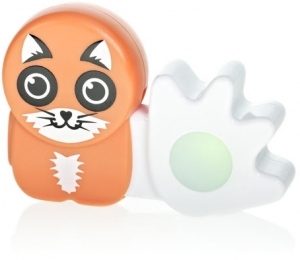Poken not
by Volker Weber

Two days ago I asked on Facebook and Twitter: "Did you use a Poken in 2010?" The most telling answer was: " As usual I have no idea what you're talking about." So, what's a Poken? Two Pokens exchange information when you put them together. It's designed to be the new business card. Until two days ago, I saw three problems:
- They look silly.
- They cannot achieve critical mass.
- You have to carry it with you.
But there is a real killer: the Poken has a CR1632 lithium battery which only lasts for six months at best. It won't charge on your USB port. By the time you finally want to use it, the battery is probably going to be dead.
There are quite a few software solutions for iPhone & Co (examples: 1, 2). They don't look silly, you don't have to carry something extra. But they also fail to achieve critical mass.
Until then I am keeping this as a photo on my phones. QR codes are not mainstream yet. But they are increasingly used so people might eventually know what to do with them.
Comments
If you had the caveman or ninja Poken you'd feel differently about them ;o)
Agree with the comment that they need to achieve a critical mass to become useful. And my battery has run out.
What do you think would be the effect of handing one to each of 5,000 Lotusphere attendees? A good opportunity to use them during the week, and then the word would spread when people return to their daily lives.
I'm not convinced by the idea of having business card data for everyone I meet on my mobile phone. I'm looking at the stack of cards here on my desk and thinking I don't want that much info jamming up my BlackBerry address book.
Handing out Pokens to everyone at a conference is the their business model. But 5000 new Pokens is a drop in the desert. When people return to their daily lives, they are going to be the only one who owns a Poken. That is about as sexy as being the only one with a phone.
And yes, I don't think I would want everybody in my address book as well.
Well , an passport/ID card with rfid ship can do the same :-) at least i think so.
The CR1632 aren't easy to find and after a replacement, my poken remained dead.
btw, hoccer is a third solution for more than contacts and both xing and linked adopted the mobile handshake, but handling is still far to complicated.
And don't forget to add Bluetooth/IRDA on the early mobiles to the history of failures. I remember a time when exchanging cards via the Nokia Communicator was hip.
I know I have used it successfully at a few geek conferences, and over in Asia. Here, no. Also with 5k people, it only holds 50 at a time before sync is needed. I do like the idea that is also lets you look like you are trading information, but it puts a ghost entry for yourself there until you approve it.
All the apps have business models for the iPhone and Android. One that is web based, multiple cards support, web widgets, social network links, hide what areas you wish per card and more is NyNameIsE. I still use that service and allows me to send my card via email.
You can view my current online card right here for demo.
On my Nokia I just have a Contact entry with my own data (including picture). If someone wants it I bluetooth it to his mobile, that's it. I can even limit the data down to only one detail like phone number or email address.
Sorry, I just forgot there are some phones around, which use bluetooth only for headsets ;-)
Having a built-in app to exchange contact information tops my list of things missing on the iPhone.
Does Palm own a patent for beaming a business card?

